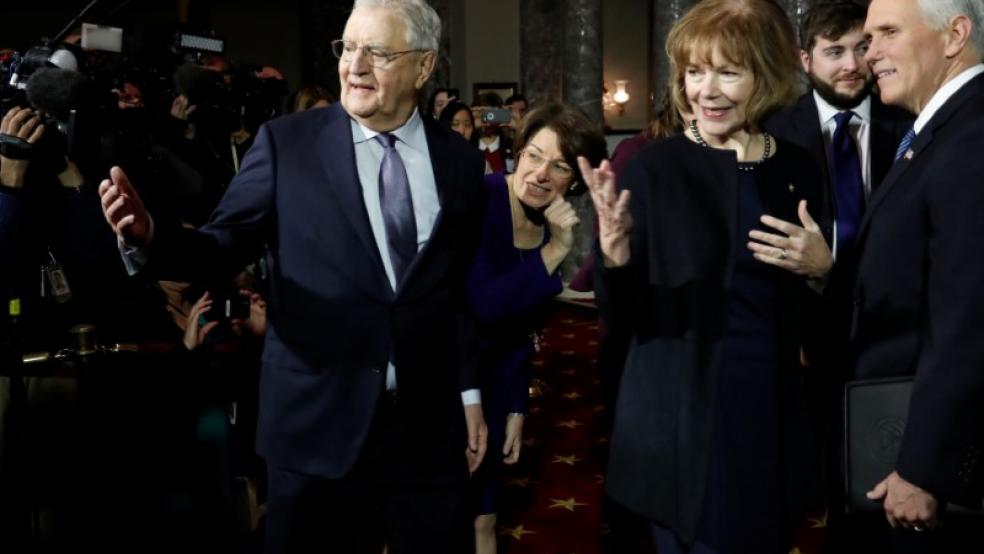WASHINGTON (Reuters) - Democrats boosted their ranks in the U.S. Senate on Wednesday, trimming Republicans' edge in the chamber to 51-49 with the swearing in of two new lawmakers from Alabama and Minnesota.
In a ceremony at the U.S. Capitol, officials administered the oath of office to Doug Jones, who won last month's special election in Alabama to become the state's first Democratic senator in 25 years, and Tina Smith, who is replacing fellow Democrat Al Franken a day after he resigned over sexual harassment allegations.Vice President Mike Pence conducted the swearing-in ceremony for both Democrats simultaneously. Jones was escorted to the Senate chamber by former Vice President Joe Biden, while former Vice President Walter Mondale, who is also a former senator from Minnesota, accompanied Smith.In taking his seat, Jones, 63, a former federal prosecutor who won a bitterly fought special election last month against Republican Roy Moore, reduced the Republican majority in the Senate to 51-49.Moore, a Christian conservative and former judge, had his campaign hobbled by accusations of sexual misconduct with teenage girls while he was in his 30s. The seat was formerly held by Republican Jeff Sessions, now President Donald Trump's attorney general. Jones' victory left Trump's Republicans even less room for defections from within their party as they pursue legislative initiatives such as an infrastructure plan, entitlement changes and scaling back Obama-era regulations on industry.Smith, 59, brings the number of women in the Senate to a record-high 22. Smith, who served as her state's lieutenant governor, was appointed by Minnesota's governor to replace Franken.Senate Majority Leader Mitch McConnell, who was seen speaking with Jones just after the swearing-in, welcomed the newcomers in a brief floor speech, and said he hoped the chamber could address issues in a renewed spirit of bipartisanship.McConnell then plunged immediately into a Republican talking point. He said lawmakers should "set aside the arbitrary notion" that new defense spending should be matched equally by new non-defense spending - a key Democratic request in negotiations set to resume between the parties later Wednesday on a government spending bill.Congress must reach an agreement by Jan. 19, or face a government shutdown.A Democratic takeover of the Senate in November's elections could partially stifle the Trump administration's agenda but the party's chances are uncertain. One-third of the seats in the chamber will be up for grabs and Democrats will be defending many more seats than Republicans in this round.Republicans in 2017 used their thin Senate majority to help a pass a tax overhaul with their colleagues in the Republican-controlled House of Representatives. But they fell short in their effort to repeal former President Barack Obama's signature healthcare program, after three Senate Republicans rejected the bill.Senator Orrin Hatch, a Utah Republican, said on Tuesday he would not seek re-election in November, following fellow Republicans Bob Corker and Jeff Flake who announced last year they would retire. Hatch's move opens the door to a potential run by Mitt Romney, the Republican's unsuccessful 2012 presidential nominee and one of the party's top critics of Trump. (Reporting by Susan Cornwell; Writing by Susan Heavey; Editing by Chizu Nomiyama and Bill Trott)Senate swears in Democrats from Alabama, Minnesota

JONATHAN ERNST



